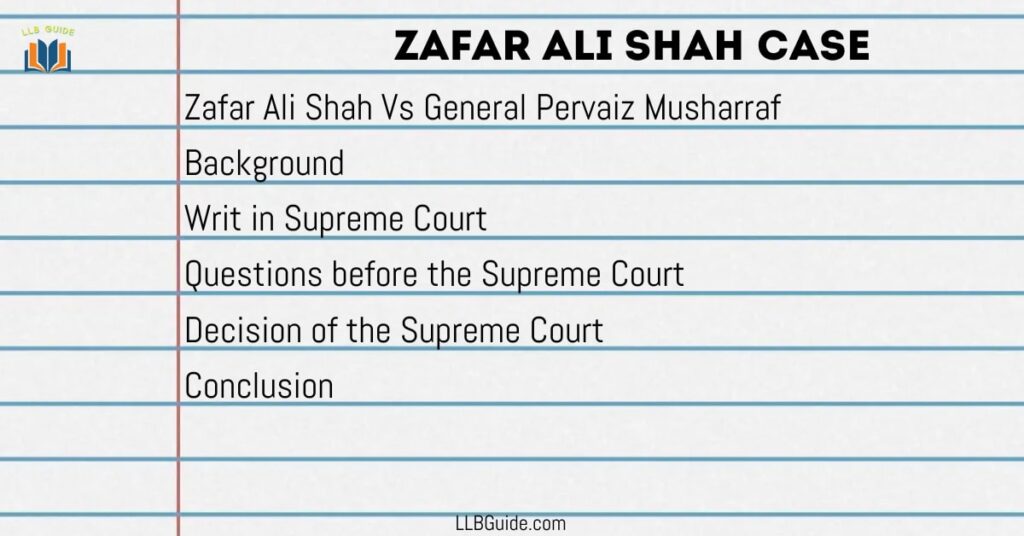Zafar Ali Shah case is another important case in which martial law imposed by the Chief of Army Staff was challenged in the Supreme Court of Pakistan under article 184 (3) of constitution 1973 but the Supreme Court of Pakistan validated it again relying on the Kelsens Theory. Let’s jump into the Zafar Ali Shah Case.

Table of Contents
Zafar Ali Shah Vs General Pervaiz Musharraf PLD 2000 SC 869
In this case Zafar Ali Shah who was a member of National Assembly challenged Martial law imposed in the country by the Chief of Army Staff General Pervaiz Musharraf.
Background Of Zafar Ali Shah Case
After Kargill War, there was an element of mistrust and bitterness between General Pervaiz Musharraf and the Prime Minister Mian Muhammad Nawaz Sharif.
On 12th of October 1999, when General Pervaiz Musharraf returned from an official visit to Sri Lanka, his plane did not allowed to land on the airport on the order of Mian Muhammad Nawaz Sharif. He also appointed General Zia-ud-Din Butt as the new Chief of Army Staff on the same day.
The Senior officers of Army refused to obey the orders of the Prime Minister and this new appointment. They made sure of landing of the plane of General Pervaiz Musharraf and also took over the whole country.
General Pervaiz Musharraf spoke to the nation about what the Prime Minister wanted to do with him and his crew when they had low feul on the plane and how he landed on his return from official visit.
On 14th of October 1999, General Pervaiz Musharraf issued an order named as “Proclamation of Emergency Order”. In which he announced that he has taken the office of Chief Executive of Pakistan and the Constitution of Pakistan had been set to obeyance (temporary suspended). He also dismissed National and Provincial Assemblies and the Senate.
He also issued another order on the same day named as “Provincial Constitution Order” (PCO). Through this order it was said though the constituion is in obeyance even than as nearly as possible the country shall be governed according to the same constitution, until it did not repugnent to any order of the Chief Executive. He also set to enforce the existing laws in the country and the Courts shall continou to work but any Court cannot pass any judgement or order against the order of Chief Executive. He also gave himself the power to amend the Constitution when needed.
General Pervaiz Musharraf issued another order named as “Oath of Judges Order 1999”. In which it was stated that all the fresh judges shall take oath under PCO. In year 2000 by issuing another order he made all the existing judges to take oath under PCO, and all the judges shall defend the emergency and the PCO.
Writ in Supreme Court
Zafar Ali Shah filed a writ petition in the Supreme Court of Pakistan under article 184 (3) of the Constitution of 1973 and challenged martial law by General Pervaiz Musharraf. Some other petitions were also filed as same.
This petition was heard by an eleven member bench headed by Chief Justice Mr. Irshad Hassan Khan.
Questions before the Supreme Court
The Supreme Court had to determine the following two questions under this petition:
- Whether the powers of the Supreme Court to judicial review had been restricted?
- Whether martial law imposed by General Pervaiz Musharraf was valid or not?
Decision of the Supreme Court
The Supreme Court consolidated all the petitions in a single judgement. It was an very long judgement, the main points were:
The Supreme Court in response to first question held that any law legislated by any authority cannot restrict its power to judicial review because it is an inherent power of the Supreme Court.
In response to second question the Supreme Court held in favour of General Pervaiz Musharraf and validated martial law imposed by him on the following grounds:
- There were allegations of corruption against the Prime Minister,
- The other ministers of National and Provincial Assemblies were also involved in corruption,
- The country’s economy was about to collapse due to this corruption,
- The Prime Minister has through constitutional amendment removed the article 58 (2) B and became more powerful,
- There were no other options to restore the country other than the emergency,
- And judiciary was also being ridiculed by the Parliament.
The Supreme Court by its order provided 3 years to General Pervaiz Musharraf to govern the country and get it back on track, he can also make amendments in the constitution. But before 90 days before the expiry of these 3 years he need to announce the date of election.
Conclusion
In Zafar Ali Shah vs General Pervaiz Musharraf case the Supreme Court again validated martial law on the basis of Theory of necessity. So, Zafar Ali Shah case is Important.

